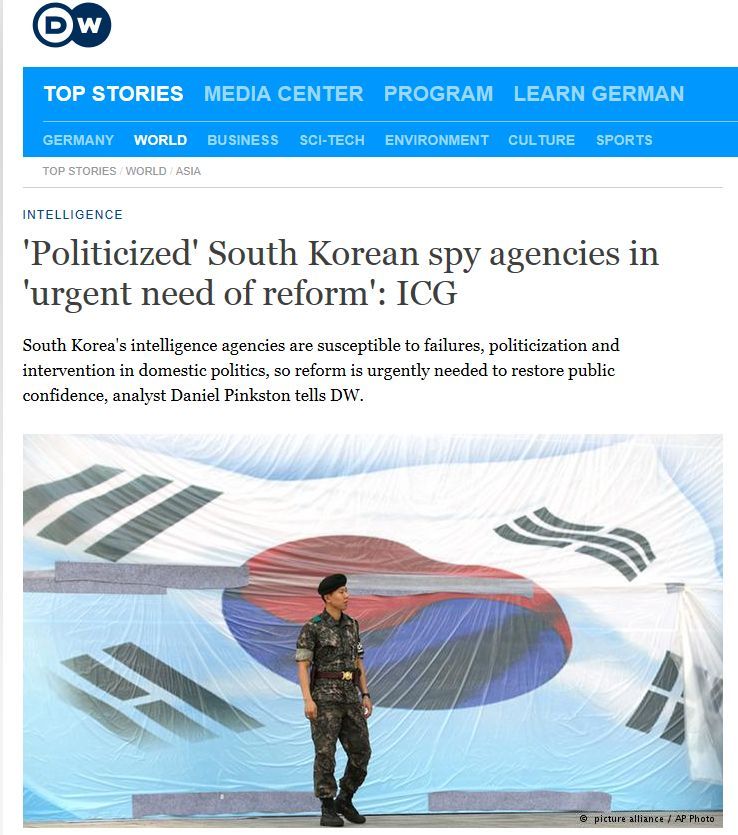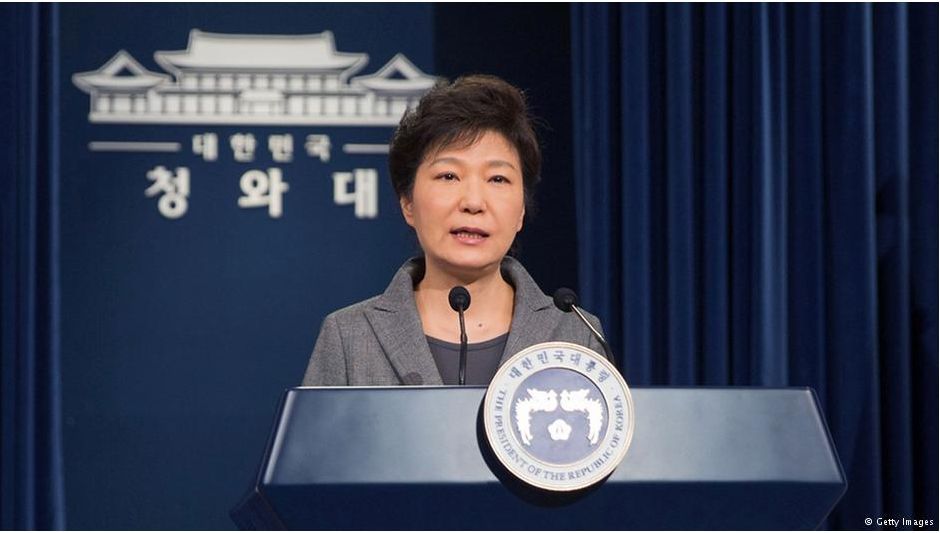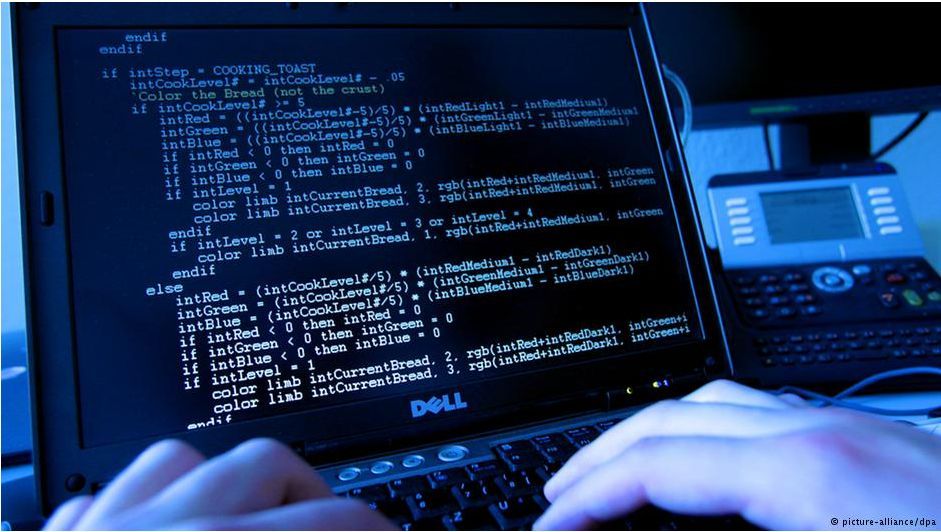정치개입 및 정보 조작, 미국도 예민한 정보 공유 꺼려해
-세계분쟁감시그룹 동북아 프로젝트 부국장 다니엘 핑크스톤 인터뷰
|
|
[플러스코리아타임즈 임영원기자] 독일의소리 방송인 도이체벨레가 6일 한국 국정원의 지난 2012 대선개입은 대통령의 지시로 이루어진 것이라는 보도를 내보냈다.
이 같은 사실은 도이체벨레가 최근 “한국 정보기관이 가진 고질병의 위험”이라는 제목의 보고서를 낸 세계분쟁감시그룹의 동북아 프로젝트 부국장인 다니엘 핑크스톤과의 인터뷰에서 언급한 것으로 국제적인 감시그룹이 지난 대선의 국정원 개입이 국가지도자의 지시로 이루어진 것이라고 말해 이를 지시한 사람이 대통령임을 확인한 것으로 충격을 주고 있다.(세계분쟁감시그룹 보고서는 지난 6일 뉴스프로가 번역한 바 있다.
☞ “한국 정보기관이 가진 고질병의 위험” 보고서에 대한
뉴스프로 기사 보러가기)
일반적으로 국가지도자는 대통령이나 국가의 수반을 뜻하는 것으로 여기에서 국가지도자는 곧 그 나라의 수반, 한국에서는 대통령을 뜻한다고 볼 수 있다. 그동안 이명박 대통령 재임 시 치러진 대선에서 국정원의 광범위한 대선 부정개입이 확인되면서 지난 박근혜 정권 일 년 동안 뜨거운 쟁점이 되었고 그 가운데 과연 국정원의 대선 부정개입이 국정원의 단독작품인지 아니면 이명박 대통령의 지시에 의한 것인지에 대해 온갖 추측들이 난무했다.
이런 가운데에 도이체 벨레의 인터뷰 기사 중 비록 단 한 마디의 언급이지만 (어느 대통령인가에 대한 언급은 없지만) 국정원의 대선 개입이 대통령의 지시에 의한 것이라는 것을 언급했다는 점에서 큰 의미를 갖고 있다. 다니엘 핑크스톤의 이러한 발언은 ‘정보기관이 국내 정치에 어떻게 개입했으며 왜 그랬을까?’라는 질문에 대답하는 과정에서 나온 것으로 다니엘 핑크스톤은 국정원의 개입에 관한 예를 들며 ‘정보기관들은 독자적으로 혹은 정책적 목적을 이루기 위해 국가지도자가 내린 지시에 따라 개입했다. 1970년대 한국 중앙정보부가 김대중을 납치한 사건도 있었고, 2012년 대선 당시 국정원이 인터넷 부정행위를 저지른 것도 또 다른 예’라고 명확하게 지적했다.
그렇다면 국정원의 대선 개입을 지시한 사람으로 지목된 국가지도자는 여러 정황상으로 선거 당시의 대통령이었던 이명박 전 대통령이라고 유추할 수 있는 합리적인 추론이 가능하다. 다니엘 핑크스톤이 국제적인, 특히 동북아에 대한 정보기관에 대한 전문가라고 볼 때 그의 발언이 아무런 근거 없이 이루어진 것이라고 보기는 힘들 것으로 보인다.
설사 그렇지 않다하더라도 국제적으로 전문가들 사이에 국정원의 대선부정개입이 국가지도자의 지시로 이루어진 것이라는 인식이 넓게 공유되고 있다는 것을 보여주고 있는 것이라 할 수 있다. 물론 국정원이 국가수반의 허락이 없이 자체적으로 그렇게 광범위한 부정개입을 할 수 없다는 것은 상식에 속하는 일이다.
도이체벨레의 이 인터뷰 기사는 세계분쟁감시그룹이 낸 “한국 정보기관이 가진 고질병의 위험” 이라는 보고서를 두고 이에 대해 한국의 국정원의 문제점을 더욱 자세하게 언급하는 내용으로 진행됐다. 내용은 보고서와 별 다를 바 없지만 도이체 벨레의 질문에 대해 다니엘 핑크스톤 기자가 더 상세하게 예를 들어 언급하는 내용이 들어 있어 주목을 끌고 있다.
특히 다니엘 핑크스톤은 박근혜가 권력을 쥐게 된 지난 2012년 대선 기간의 인터넷 불법행위 같은 행동이 민주절차를 훼손한다며 정보기관이 정책의 선택에 영향을 주기위한 수단으로 정보보고를 왜곡하거나 걸러낸다면 정보가 “정치화”될 수 있다고 지적하기도 했다. 이 기사는 이러한 국정원의 취약함으로 인해 국정원의 정보활동이 유출되었을 때 이에 따른 피해는 단순한 정보 폭로 보다 훨씬 더 심각하다며 한국의 만성적인 정보활동유출 문제로 인해 미국은 정보가 위태롭게 될 것을 우려해 일부 민감한 정보에 대해 공유를 꺼린다는 사실까지 폭로하기도 했다.
다니엘 핑크스톤은 기사 전체를 통해 한국의 국정원이 한국 정보기관은 정보활동 실패, 정치화, 국내정치 개입 등에서 취약함을 드러냈다며 그 자세한 내용들을 언급하고 있다. 다니엘 핑크스톤은 기사 말미에서 국정원이 이로 인해 국민들로부터 신뢰를 잃었다며 한국은 정보능력을 증진시키는 동시에 한편으로는 국내정치 개입의 위험성을 최소화하기 위한 통제와 균형 그리고 감독을 충분히 해야 할 것이라고 조언하기도 했다.
이 인터뷰 기사에서 언급한대로 만약 국정원의 대선개입을 지시한 사람이 이명박이라는 것이 확인된다면 이는 대한민국의 민주질서와 헌법적 근간을 뒤흔드는 것으로 내란범에 해당된다고 볼 수 있다. 그렇다면 이명박 전 대통령의 구속수사는 물론이고 박근혜의 대통령 당선조차 무효화 시켜 대한민국의 근본을 다시 세워야 할 것이다.
다음은 뉴스프로가 번역한 도이체벨레의 다니엘 핑크스톤 인터뷰 기사 전문이다.
번역 감수: 임옥기사 바로가기☞
http://www.dw.de/politicized-south-korean-spy-agencies-in-urgent-need-of-reform-icg/a-17834318‘Politicized’ South Korean spy agencies in ‘urgent need of reform’: ICG
‘정치화’한 한국 국정원 ‘개혁의 필요 시급’: 세계분쟁감시그룹(ICG)South Korea’s intelligence agencies are susceptible to failures, politicization and intervention in domestic politics, so reform is urgently needed to restore public confidence, analyst Daniel Pinkston tells DW.
한국 정보기관은 정보활동 실패, 정치화, 국내정치 개입 등에 취약함을 나타내고 있어서 대중의 신뢰를 얻기 위해 개혁이 시급히 필요하다고 분석가 다니엘 핑크스톤이 도이체벨레에 말한다.
06.08.2014, Gabriel Dominguez
 |
The image of South Korea’s intelligence services has been repeatedly tainted over the past years due to a series of scandals. But the situation worsened in the fall of 2012 when many in the main opposition party, the New Politics Alliance for Democracy – then named the Democratic Party, accused the country’s National Intelligence Service (NIS) of swaying the outcome of the December presidential election through an Internet smear campaign against opposition candidate Moon Jae-in to ensure the victory of incumbent President Park Geun-hye. The public’s trust and confidence in the intelligence community has been severely damaged ever since.
한국 국정원의 이미지는 일련의 스캔들로 과거 몇 해에 걸쳐 거듭 퇴색되어 왔다. 하지만 주요야당인 새정치민주연합(당시 이름은 민주당) 소속 국회의원 다수가, 현 박근혜 대통령이 선거에서 이기도록 야당의 문재인 후보에 대해 인터넷을 이용한 비방 캠페인을 벌여 지난 12월 대통령 선거의 결과에 영향을 주었다고 국정원을 비난했던 2012년 가을에 상황은 더욱 악화됐다. 그 이후로 정보기관에 대한 대중의 믿음과 신뢰는 심하게 훼손됐다.
Daniel Pinkston, Deputy North East Asia Project Director at the International Crisis Group who co-authored the report, titled “Risks of Intelligence Pathologies in South Korea,” says in a DW interview that intelligence in South Korea is sometimes being manipulated with the aim of influencing the policy-making process. This is done so that the decision-makers’ choices are more aligned with the policy preferences of the intelligence agencies, thus creating risks for both the country and beyond, he adds.
세계분쟁감시그룹의 동북아 프로젝트 부국장이며, “한국 정보기관이 가진 고질병의 위험”이라는 제목의 보고서(역주: 이 보고서의 번역은 뉴스프로 링크 참조)를 공동 저술한 다니엘 핑크스톤은 도이체벨레와의 인터뷰에서 한국에서의 정보는 정책입안 과정에 영향을 주려는 목적으로 때로 조작된다고 말한다. 이렇게 함으로써 의사결정자의 선택이 정보기관이 선호하는 정책과 보다 잘 맞아 떨어지도록 하며, 그 결과로 국내외에 위험을 초래한다고 그는 덧붙인다.
DW: In your report you speak of risks of intelligence pathologies. What do you mean by that?
DW: 보고서에서 당신은 정보기관의 고질병의 위험에 대해서 말하고 있다. 그게 무슨 의미인가?
Daniel Pinkston: Scholars and analysts mostly cover two types of intelligence problems or “pathologies.” These are “intelligence failure” and the “politicization of intelligence.” There are several examples of “intelligence failure” such as Pearl Harbor and the 9/11 terrorist attacks. The failures can occur anywhere along the intelligence process: collection, processing, analysis, and distribution to consumers (policymakers).
다니엘 핑크스톤: 학자들과 분석가들은 대개 두 가지 형태의 정보기관의 문제점 혹은 “고질병”을 다룬다. 이 두 가지는 “정보활동의 실패”와 “정보의 정치화”이다. 진주만과 911 테러리스트 공격과 같이 “정보활동의 실패”의 예들이 여러 가지 있다. 이 실패는 정보활동 과정, 즉 정보수집, 처리, 분석 그리고 정책입안자들과 같은 소비자들에게 배포하는 과정의 어느 곳에서도 일어날 수 있다.
 |
Daniel Pinkston says that actions like Internet malfeasance during the 2012 presidential election,which saw Park Geun-hye reach power, distort the democratic process
다니엘 핑크스톤은 박근혜가 권력을 쥐게 된 지난 2012년 대선 기간의 인터넷 불법행위 같은 행동이 민주절차를 훼손한다고 말한다
|
Policymakers might receive an inferior or faulty intelligence report because the agency could not collect the data; or the data were collected, but were put aside or ignored during processing; or the analysts make analytical errors due to cognitive bias, faulty assumptions and/or bad models.
정책입안자들은, 정보기관이 자료를 수집할 수 없었거나 자료가 수집되었더라도 처리과정에서 이 자료들이 방치, 또는 무시되었거나, 혹은 분석가들이 스스로의 지적 편견, 잘못된 가정 그리고/또는 잘못된 모델 때문에 분석 오류를 범함으로써 열등한 혹은 잘못된 정보보고를 받을지도 모른다.
On the other hand, intelligence can become “politicized” if an intelligence agency distorts or filters reporting in a way that influences policy choices. A prime example would be the reports on the issue of weapons of mass destruction in Iraq: the then US Vice President Dick Cheney reportedly went to the CIA to “cherry pick” the data to fit the outcome he wanted to see.
또 한편으로, 정보기관이 정책의 선택에 영향을 주기 위한 수단으로 정보보고를 왜곡하거나 걸러낸다면 정보가 “정치화”될 수 있다. 가장 적절한 예는 이라크에서의 대량파괴무기의 문제에 관한 보고서일 것인데, 당시 미국 부통령 딕 체니는 자신이 보기를 원했던 결과에 들어맞는 자료들을 “선별”하기 위해 CIA에 갔다고 전해진다.
To which extent are South Korea’s spy agencies politicizing intelligence?
한국의 국정원은 어느 정도까지 정보를 정치화하는가?
The report refers to the deliberate distortion of intelligence products – at some point in the processing of intelligence – to influence policy making. In other words, someone in the intelligence agency manipulates the intelligence with the aim of influencing the decision-maker’s choices to be more aligned with his or her policy preferences. The Dick Cheney example above fits this description.
보고서는 정보처리과정 중 어느 단계에서 정책수립에 영향을 주기 위해 정보생산물을 의도적으로 왜곡하는 것을 언급한다. 달리 말하면 정보기관의 어떤 사람이, 의사결정자의 선택이 자신이 선호하는 정책과 더 가깝도록 영향을 미칠 목적으로 정보를 조작한다는 것이다. 위에서 말한 딕 체니의 예는 이것을 설명하기에 적합하다.
The report mentions that the intelligence capacity of the Republic of Korea (ROK) has, of late, shown a range of weaknesses and failures. What are these weaknesses?
이 보고서는 대한민국의 정보능력이 최근에 취약함과 실패를 보여주었음을 언급한다. 이 취약함들은 무엇인가?
Most of the processes in the ROK intelligence community work pretty well. However, they could do much better as there is an urgent need to acquire the sophisticated hardware and intelligence collection platforms to ensure that they have adequate early warning capabilities in the shadow of North Korea’s rising nuclear and missile threats.
한국 정보기관들의 정보활동 절차는 상당 수준이다. 그러나 북한의 점증하는 핵-미사일 위협에 맞서 적절한 조기 경보 능력을 보장하기 위한 정교한 하드웨어와 정보수집 플랫폼을 긴급히 확보할 필요가 있는 상황이므로 그들은 이보다 훨씬 더 잘 해야한다.
The country could also enhance intelligence sharing with the United States by doing a much better job at protecting classified information. When intelligence is leaked, the damage often is much greater than the simple disclosure of the information. Intelligence leaks will often tip off adversaries or competitors that somehow someone has gained access to information they wish to protect; therefore, they will take measures to deny that access. Due to South Korea’s chronic leak problem, the US is reluctant to share some sensitive intelligence because of fears it will be compromised.
한국은 기밀 정보를 보호하는 일을 훨씬 더 잘 함으로써 미국과 정보 공조를 높일 수도 있었다. 정보활동이 유출됐을 때, 이에 따른 피해는 단순한 정보 폭로 보다 훨씬 더 심각하다. 정보활동의 유출은 종종 보호하고자 하는 정보에 누군가가 어떤 경로를 통해서든 접근했다는 사실을 적이나 경쟁자들에게 알려주는 역할을 하게 될 것이며, 따라서 이들은 이 접근을 차단시키는 조치를 취하게 될 것이다. 한국의 만성적인 정보활동유출 문제로 인해 미국은 정보가 위태롭게 될 것을 우려해 일부 민감한 정보에 대해 공유를 꺼린다.
Are there any shortcomings in terms of staff training?
요원 교육과 관련해서 잘못된 점이 있는가?
South Korea could do a better job ensuring that intelligence officers up to the senior levels are professional and qualified; promotions and appointments should be based on merit and not on school ties or friendships. For the most part, I think the latter is the case.
간부급에 이르기까지 정보 요원들이 전문적이고 능력을 갖추어야하는 면에서 한국은 지금보다 더 잘 해야한다. 진급과 요직 임명은 학연이나 지연이 아니라 능력에 의거해야 한다. 그런데 대부분의 경우 학연, 지연에 의존하고 있다고 나는 생각한다.
I believe the vast majority of the intelligence officers and analysts in the NIS and other ROK intelligence institutions are very professional and dedicated. However, recent scandals are a clear indication that the ROK intelligence community can do better.
난 국정원과 다른 한국 정보기관 요원들 대부분이 아주 전문적이고 헌신적이라고 생각한다. 그러나 최근 스캔들은 한국의 정보기관들이 이보다 더 잘 해야함을 보여준다.
In which ways have intelligence agencies intervened directly in domestic politics and why?
정보 기관이 국내 정치에 어떻게 직접적으로 개입했으며 왜 그랬을까?
They have intervened independently or at the behest of state leaders to achieve their policy objectives. The Korea Central Intelligence Agency’s kidnapping of Kim Dae-jung in the 1970s, and the Internet malfeasance during the 2012 presidential election campaign is another. These actions distort the democratic process, but of course, the degree of egregiousness varies. The Internet comments of 2012 are mild compared to kidnapping and election rigging, for example.
정보 기관들은 독자적으로 혹은 정책적 목적을 이루기 위해 국가지도자가 내린 지시에 따라 개입했다. 1970년대 한국 중앙정보부가 김대중을 납치한 사건도 있었고, 2012년 대선 당시 국정원이 인터넷 부정행위를 저지른 것도 또 다른 예다. 이러한 행동들은 민주적 절차를 왜곡한다. 물론 왜곡의 정도는 천차만별이지만. 예를 들어 2012년 인터넷 댓글은 납치나 부정선거와 비교할 때 그 정도는 약하다.
I believe the NIS is more constrained than ever, and the likelihood of direct intervention in domestic politics is lower than ever. However, the recent scandals show that the possibility has not completely disappeared. Hopefully, the recent events will lead to serious reflection and appropriate reform.
국정원이 전보다 더 많은 제약을 받고 있어서, 국내정치에 직접 개입할 가능성이 전보다 낮다고 믿는다. 하지만 최근의 추문에서 보여주듯, 가능성이 완전히 사라진 것은 아니다. 최근의 사건으로 진지한 반성과 적절한 개혁을 하게 되길 바란다.
 |
Pinkston says there is an urgent need for Seoul to acquire sophisticated hardware and software to ensure adequate early warning capacity, given North Korea’s threats
북한의 위협을 고려할 때에, 적절한 조기 경보능력을 보장하기 위한 정교한 하드웨어와 소프트웨어를 한국당국이 긴급히 확보할 필요가 있다고 핑크스톤이 말한다.
|
What else should Seoul do to enhance its intelligence services?
정보기관의 질을 향상시키기 위해 한국이 해야 할 일은 그 밖에 무엇인가?
I believe the South Korean intelligence community must regain the trust of South Korean citizens. This will take time, and all democracies struggle with this issue. In the wake of Edward Snowden’s disclosure of the National Security Agency’s surveillance activities, a debate has emerged regarding the right balance of state secrecy and citizens’ right to privacy.
한국 정보기관은 한국 국민들의 신뢰를 다시 얻어야 한다고 믿는다. 이것은 시간이 걸릴 것이며, 모든 민주국가들은 이 문제로 고심한다. 에드워드 스노우든이 미국안전국의 감시활동을 폭로한 후, 국가의 기밀과 시민들이 사생활을 보장 받을 권리 사이에서의 올바른 균형에 대한 논의가 있게 됐다.
The tension between the NIS and South Korean society is slightly different because of the legacy under authoritarian rule, so South Koreans are quite sensitive to the problem of intelligence services intervening in domestic politics.
독재정권 하에 있었던 과거 때문에 국정원과 한국사회 사이의 긴장은 약간 달라서, 한국인들은 정보기관의 국내정치 개입문제에 상당히 민감하다.
The default remedy for many has been the emasculation of the intelligence services, but now the country needs to increase its intelligence capacity given the multitude of security challenges posed by North Korea. So in sum, South Korea needs to increase its intelligence capabilities while at the same time introduce sufficient oversight as well as checks and balances to minimize the risk of intervention in domestic politics.
개선책을 소홀히 함으로써 정보기관이 무력하게 되어왔으나, 이제 북한의 안전에 대한 다수의 도발을 고려할 때에, 한국은 정보능력을 증진시켜야 한다. 요컨대, 한국은 정보능력을 증진시키는 동시에 한편으로는 국내정치 개입의 위험성을 최소화하기 위한 통제와 균형 그리고 감독을 충분히 해야 할 것이다.
Daniel Pinkston is Deputy North East Asia Project Director at the International Crisis Group.
No comments:
Post a Comment